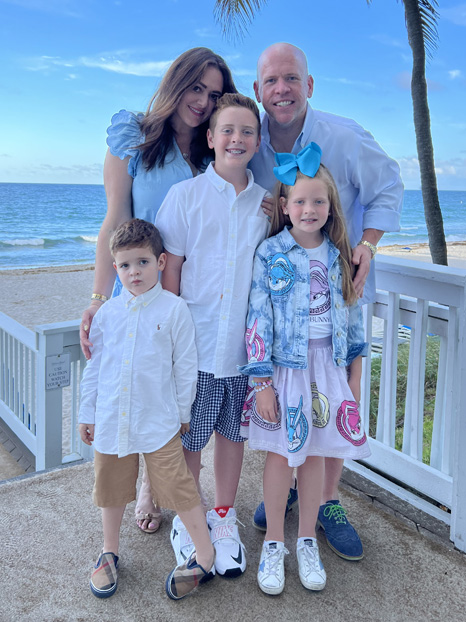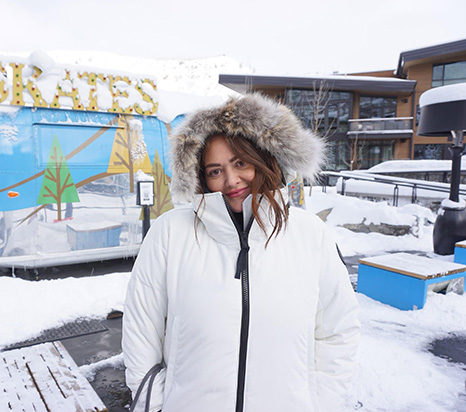Support can come in many forms, and I am here today because of the support I received.
By Lisa Marie Santamarta
If you’re anything like me, it’s close to impossible to admit you need help, unbearable to think that you can’t fight your illness alone. I’m telling you — YOU CAN’T. I’ve never admitted this to anyone, but I was ashamed I had brain cancer. I was ashamed that my body was weak and that my life was out of my control. I have always been a diligent, assiduous, and goal-orientated person. A problem solver. Yet, I couldn’t do anything about this disease. All I could do was accept that this was my life now and that I couldn’t face this monster on my own. I decided I had two choices: dwell on the shame and weakness I felt, or accept help, bury my pride, and fight.
 Lisa Marie Santamarta and her family
Lisa Marie Santamarta and her familyIn August of 2020, I was diagnosed with a grade III anaplastic meningioma. As if 2020 wasn’t bad enough, my diagnosis swooped in, ripping any solid ground right from under me. My world collapsed. The fear, pain, and emotional struggle are so real, and it’s devastating to the core. While I suffered a lot, I am thriving because my support system was like nothing I’d ever seen. Support can come in many forms, and I am here today because of the support I received.
For the first time in my life, I welcomed any and all support because I knew it was a matter of survival. Utilizing various forms of support helped me get through the hardest and darkest year of my life. If it wasn’t for all the help I received, I’d probably still be standing in my family room screaming and slamming throw pillows into the wall — angry and hopeless. My support system grounded me, calmed me, kept me organized, kept me nourished, and kept me rested. They kept me alive.
I received support from many places, the most significant from family and friends, trusted doctors, and my faith. The doctors at Sylvester Comprehensive Cancer Center counseled me through my options and helped me develop a plan to stay on track, focused, and informed. The radiology technicians at the Dwoskin Proton Therapy Center — Jessica, Johnathan, and James — made six weeks of daily radiation bearable. Seeing their familiar faces every single day and joking with them made me feel safe and comfortable. The family members who dropped everything to be at my side every single day, running my house and caring for my kids, allowed me to focus on my own recovery. The friends who constantly checked in and sent food, and things to keep my kids entertained, reminded me that I was loved and people were rooting for me. My psychiatrist helped me understand every emotion I was feeling, every pain, every fear. And most importantly, he helped me vocalize those feelings so I could confront them and begin healing.
Lastly, praying suddenly became a huge part of my life. Since the day I was diagnosed, my husband, our three kids, and I have prayed together every night. We hold hands at the end, and all say what we are most grateful for that day. I realize how blessed I am to have had all these forms of support available to me, because to survive the kind of cancer I had really does take a “village,” and then some.
Once I recovered from brain surgery and finished six weeks of radiation, I switched from survival mode to recovery mode, and my support needs changed as well. I no longer need constant communication with my doctors, but I continue to check in with them every three months for my scans. This consistency of care gives me the reassurance and motivation I need to get through the next three months until my next scan. While I no longer rely on family to shuttle my kids around and cook my meals, I know they are there if I need them. They know I still have some limitations, and I tire quickly, so they are patient and accommodating. My psychiatrist — well, I’m not sure if the mental and emotional weight of carrying around a diagnosis like mine ever goes away — maybe ask me again in a year or so.
My physical support needs also changed at around eight months post-radiation. At that time, I realized I needed a more vigorous exercise regime if I was ever going to return to my pre-cancer fitness level. I got back in the gym and started working out with my trainer again. Consistent exercise in a gym setting has benefits beyond the physical. It not only keeps my body moving and rebuilds the muscle and energy I lost during recovery, but it also has the benefit of a community of people who lift me, support me, and push me to my limits. Training has shown me that my cancer wasn’t the end of my prior life — it didn’t take everything from me the way I thought it had. I was able to rebuild, and I am still rebuilding.

Support comes in many forms, and sometimes what we think of as the “traditional” forms of support don’t translate into our lives or match our personalities. I didn’t join a traditional support group at any point during my cancer fight — mostly due to COVID — but also because my cancer is so rare. And I couldn’t bear to sit in a group with people who had a benign meningioma with a great prognosis because that wasn’t me, and it never would be. As a millennial, I couldn’t see myself in a traditional support group setting, baring my soul and all my fears to strangers — and worse, directly to their faces. I preferred to look for my community online in a more private setting, on my terms, and on my own schedule. I set out to find support through an online community of people my age who battled a grade III anaplastic meningioma.
A needle in a haystack.
Although my search for people who survived an anaplastic meningioma was mostly futile, it eventually led me to an unexpected form of support: the support I received through telling my own story.
I started writing about my experience, my fears, what worked for me, and what didn’t. As I documented my very personal, most vulnerable moments, I realized that someone somewhere might actually benefit from knowing all this stuff! I started writing a blog, intending to publish it, but I couldn’t find the courage to click “publish” for months. Shame. Less shame now because I’m well on the road to recovery, but still, shame nonetheless. After months of hearing my husband’s aggressive “urging” and encouragement to “just rip off the Band-Aid and publish it already!” I finally caved. Begrudgingly and filled with numbing panic, I published my entire nightmare online, slammed my laptop closed, and never looked back.
The outpouring of support I received from everyone was overwhelming and deeply appreciated. Putting myself out there also erased all the shame and fear that weighed me down for the last year. I no longer feared someone asking about my scar or staring at my bald spot. And I stopped feeling ashamed for looking like a Michelin tire from all the steroids.
I knew my story and how I got here.
And I started to realize that all these people in my life and even complete strangers were both immensely proud of me and thoroughly impressed by me. So why wasn’t I? Why was I my biggest critic? I started to see and appreciate my strength in new ways. And so, when I began to really focus on supporting others through my blog, I received the gift of support right back.
Thanks to my village and my own voice, I survived a dismal cancer diagnosis, I am happy and healthy a year later, and I am forever grateful.
Want to read more about Lisa Marie Santamarta’s journey? Follow her journey on her blog, The Ugly C Word.